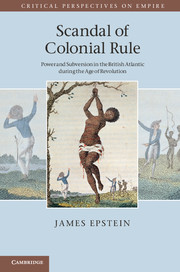Book contents
- Frontmatter
- Contents
- Illustrations and maps
- Acknowledgments
- Cast of characters
- Abbreviations
- Maps
- Introduction
- 1 Politics of colonial sensation
- 2 A gentleman's way in the world
- 3 “Only answerable to God and conscience”: justice unbounded by law
- 4 Ruling narratives
- 5 The radical underworld goes colonial
- 6 In search of free labor
- 7 Conspiracy in the archive
- Epilogue
- Index
- References
4 - Ruling narratives
Published online by Cambridge University Press: 05 June 2012
- Frontmatter
- Contents
- Illustrations and maps
- Acknowledgments
- Cast of characters
- Abbreviations
- Maps
- Introduction
- 1 Politics of colonial sensation
- 2 A gentleman's way in the world
- 3 “Only answerable to God and conscience”: justice unbounded by law
- 4 Ruling narratives
- 5 The radical underworld goes colonial
- 6 In search of free labor
- 7 Conspiracy in the archive
- Epilogue
- Index
- References
Summary
Despite complaints having reached London, it remains difficult to determine the degree to which Picton's bad rule prompted his replacement by a three-man commission headed by William Fullarton. The government of Henry Addington was under intense pressure from abolitionists to arrest the development of slavery in the newly ceded colony. As a slave owner himself and an advocate of expanding the institution of slavery, Picton was hardly the right man for this task. Significantly, the commission was charged with surveying the island and recommending alternatives to slavery; this mandate forms the subject of Chapter 6. Picton was retained as second commissioner with responsibility for military affairs.
News of the government's appointment of the commission reached Trinidad in the summer of 1802. The commission itself was short-lived; it accomplished little of governmental substance. On October 26, 1802, the Ulysses and two armed brigs sailed from Portsmouth with all those connected with the commission, except for Commodore Samuel Hood, the third commissioner, who was detained by naval duties. On December 21, they reached Bridgetown, Barbados, where they caught up with Hood, who promised to follow as soon as possible. After a two-month voyage, they arrived in the Gulf of Paria; the following day, January 4, 1803, Colonel Fullarton, his wife Marianne, her unmarried sister, Georgina, and the commission's entourage of subordinate officials disembarked at Port of Spain. Picton received Fullarton with polite ceremony; the first commissioner wore his sword and full military dress. Within less than three months, Fullarton was speaking to neither Picton nor Hood, who had arrived only one month before. The first commissioner sent emissaries to England, who reported to the colonial office on the developing situation; the scramble for metropolitan publicity had begun. In April the first news of the dispute between Fullarton and Picton appeared in the London press. From April 1 to June 7, Fullarton was absent from Port of Spain, surveying the island's coasts and harbors, as well as sailing around the southern Caribbean. Hood left Trinidad after two months, on April 27; Picton departed in mid-June, when his good friend General Frederick Maitland took over military command of the colony; with the arrival of General Thomas Hislop, the newly appointed lieutenant-governor, Fullarton sailed on July 20 1803. Soon after he returned to Britain, the Privy Council remanded Picton into the custody of the king's messenger in ordinary.
- Type
- Chapter
- Information
- Scandal of Colonial RulePower and Subversion in the British Atlantic during the Age of Revolution, pp. 130 - 155Publisher: Cambridge University PressPrint publication year: 2012

